Over many years I travelled from Australia
to the UK to attend
conferences at the University
of Sunderland
The first place I’d like to touch down is a very impressive
attraction in the city of Sunderland Britain
 |
| Stairs invite one into the green heights. |
The town centre, characterised by the Wearmouth
Bridge , features a number of old civic
institutions, among them Sunderland Museum (Burdon Rd , Sunderland
SR1 1PP , UK Mowbray Park
The Museum has occupied this site since 1879, and the
original Winter Gardens were built at that time. They were badly damaged during
the Second World War and subsequently demolished, with a new structure in the
1960s occupying the site. However, the present structure was built after
lottery-based funding came available in 2001, and the tropical house has been
recreated in a modern incarnation that is truly remarkable, both for its sheer
size and the variety of tropical species contained.
 |
| You can forget you're inside a building! |
The exterior view at the head of the article shows the
life-size bronze walrus that dominates the banks of the ornamental pool that is
thronged with birdlife, including the seagulls seen here.
I visited on my UK
foray of 2011, taking in the Museum and Mowbray Park Australia than England
 |
| Stainless steel and aluminium form a sterile touch of the outside world among a veritable jungle. |
A very nice café can be found by the entry way, and I recall
spending an easy half hour with hot chocolate, contemplating this bubble of the
tropics. Not since prehistoric times have such species flourished in this part
of the world, and the Victorian skill at glass construction – epitomised by the
ill-fated Crystal
Palace
For more information, see:
I look forward to further posts, so I hope you’ll meander
with me as I explore England and look back on the sights and experiences of
getting there and getting back.
Mike Adamson
 |
| Kong could appear from among those leaves! |
 |
| You're a long way up! |
 |
| It's a memorable view among the steamy airs. |
 |
| The actual dome and the grey British sky. |









No comments:
Post a Comment